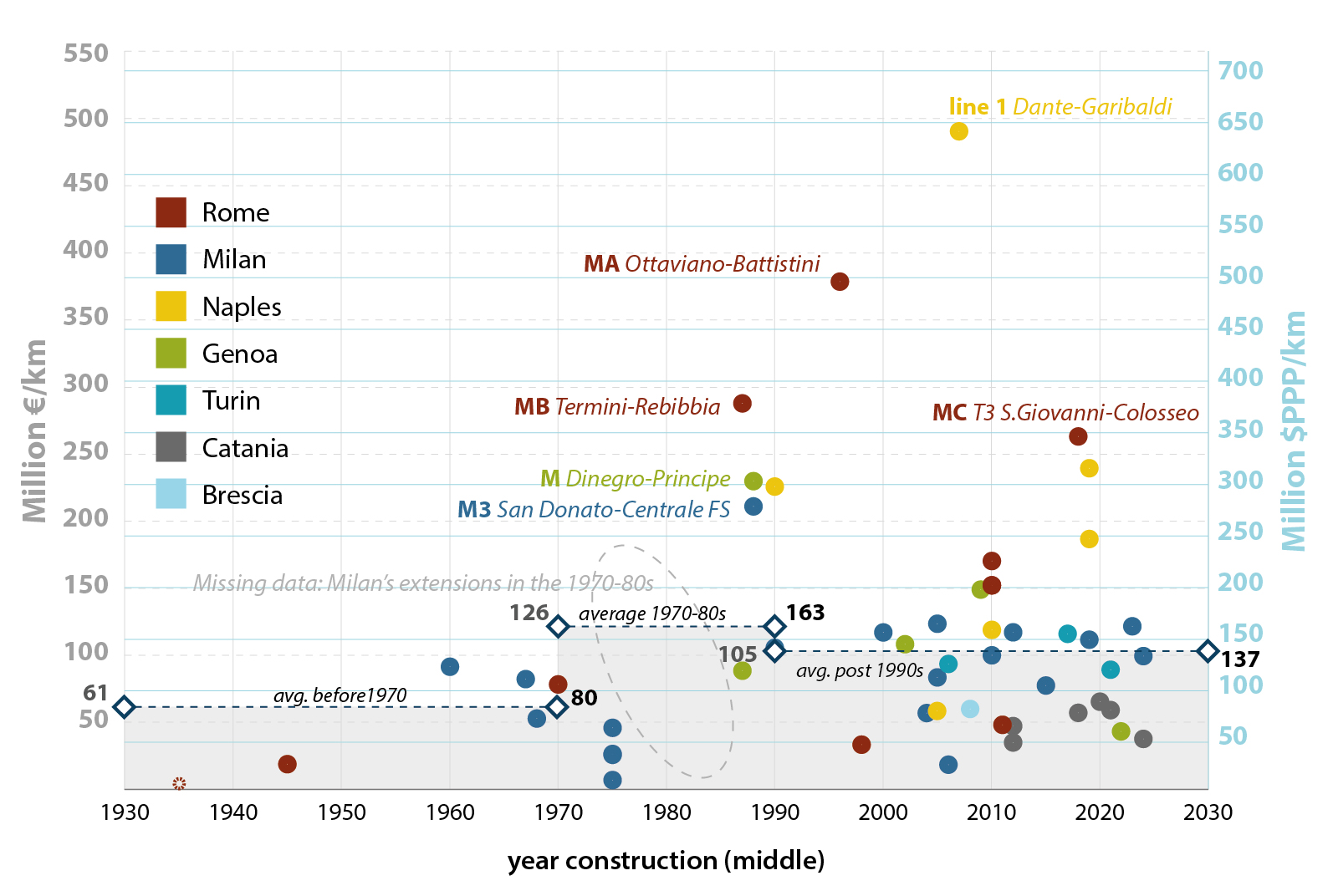facepalming_brooklynite
Active Member
I hope you're rightAs to the outcome........... don't be too pessimistic........ stay tuned.
|
|
|
I hope you're rightAs to the outcome........... don't be too pessimistic........ stay tuned.
Can we ask where in the process of debate over this proposal, the public is likely to be able to view the underlying costing information of this proposal? I believe you and others were trying to obtain such information, but might it become more public in the process of acceptance or rejection?

 transitcosts.com
transitcosts.com
Thanks very much. Have downloaded and skimmed through the first few pages. Later tonight I'll get a chance to read in more detail. Again, thanks for the insight.In thinking of your comment I remembered this page:

Italy Case
The Italian Case We have most recently updated this report on 09/16/2022. Download the Report In this in-depth case study of Italian rail rapid transit projects, we investigate how Italian construction costs have changed over time and distill lessons learned to understand how design...transitcosts.com
The PDF in here I bet has the type of breakdown of costs you and others would enjoy seeing for projects in Toronto.
Thanks very much. Have downloaded and skimmed through the first few pages. Later tonight I'll get a chance to read in more detail. Again, thanks for the insight.
Someone ran the math on our subway expansions and determined the bureaucratic Germans managed to pay less than half what we do for new expansions in significantly older cities.Building a continuous grade-separated cycling trail in a dense part of the city without ravines is going to be expensive. It's no different from building a subway downtown or the Gardiner Expressway in this regard, though the costs are still far lower than those associated with a subway or expressway.
The notion that you can get rapid transit in Toronto for around $150 million per kilometre is disingenuous. You'll get a streetcar or a slow LRT that stops for left-turning vehicles for that price in Toronto. 1 km of that isn't very helpful from a transportation perspective.
Despite the costs, the benefits of the proposed extension are massive from a transportation perspective. Many more people will get a quick and safe way of getting around without a car, which helps both cyclists and everyone on the road. Scrutinize the costs all you want, but make sure it gets built.
This is true to a degree. The problem is this corridor has been under construction since Georgetown South Project in 2009ish (?). Discussion of this project happening has pre-dated that. Through the original GTS and subsequent implementation of the fourth track, necessary future-proofing (e.g. utility relocations, structure modifications) should have been built in that it avoided major barriers that would send the price tag north. Without a financial breakdown, this looks like either a) Metrolinx mismanaged the corridor work in a way that some major item / conflict was missed, b) something was indeed reasonably unforeseen and has now come to light, c) a previously accounted cost is getting lumped into this figure, or d) Metrolinx wants to reimbursed for their efforts to facilitate this project.Building a continuous grade-separated cycling trail in a dense part of the city without ravines is going to be expensive. It's no different from building a subway downtown or the Gardiner Expressway in this regard, though the costs are still far lower than those associated with a subway or expressway.
The notion that you can get rapid transit in Toronto for around $150 million per kilometre is disingenuous. You'll get a streetcar or a slow LRT that stops for left-turning vehicles for that price in Toronto. 1 km of that isn't very helpful from a transportation perspective.
Despite the costs, the benefits of the proposed extension are massive from a transportation perspective. Many more people will get a quick and safe way of getting around without a car, which helps both cyclists and everyone on the road. Scrutinize the costs all you want, but make sure it gets built.
Meanwhile in Josh Marlow's own ward the city shows how great it is at delivering projects that were promised to residents a decade ago... Eglinton Connects. Eglinton landscaping including bike lanes. I wonder what the price would be to deliver that as planned and when we would see it.
That contract was written before Metrolinx figured out that they could hold the lanes hostage unless the city paid to backfill the roadEglinton Connects is approved; Avenue to Chaplin will go this year, should start by Sept; the balance will be delivered next year.
Its a whole lot less than 150M, for a lot more than 2km!
Are you sure? The last I heard it become EglintonTOday, which is a scaled down non-permanent version and of course painting lines on an existing street, not creating or moving any infrastructure, and not fully separating bikes from potential conflicts is cheaper than 150M.Eglinton Connects is approved; Avenue to Chaplin will go this year, should start by Sept; the balance will be delivered next year.
Its a whole lot less than 150M, for a lot more than 2km!
Are you sure? The last I heard it become EglintonTOday, which is a scaled down non-permanent version and of course painting lines on an existing street, not creating or moving any infrastructure, and not fully separating bikes from potential conflicts is cheaper than 150M.
What makes the West Toronto Railpath expensive is that they aren't converting an abandoned rail corridor, painting lines on an existing street, or creating a bike path that has a level street and railway crossings. The West Toronto Railpath is the like a limited access bikeway built from scratch.
This may not be the best thread but it's since happening in conjunction with the Kitchener Line 4th track installation around Bloor GO, latest West Toronto Railpath restoration pics. Tweet here from GO Expansion.
View attachment 602629
View attachment 602630




